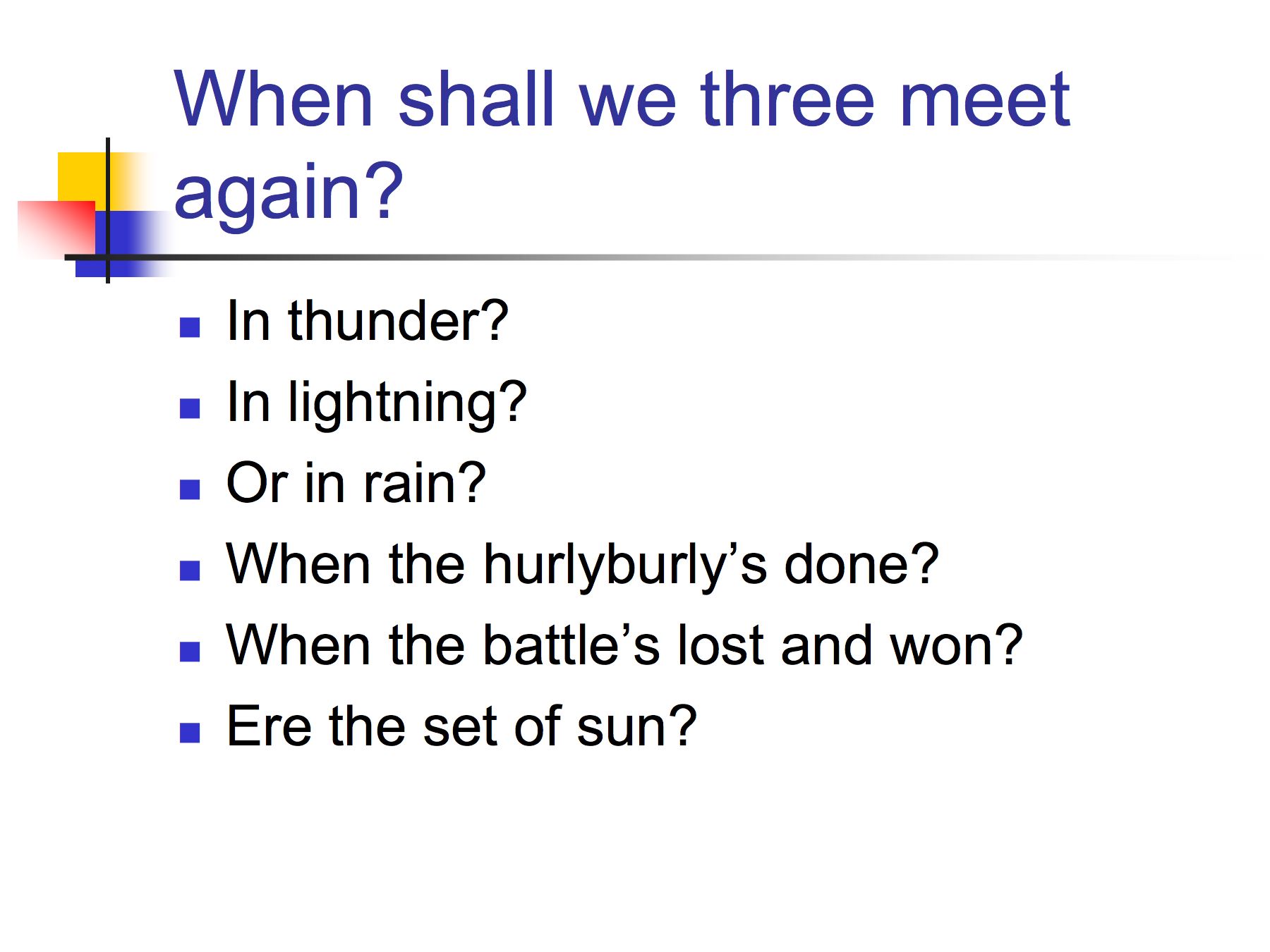If Blogging Were Like Facebook
Sunday, May 24th, 2009Shakespeare Teacher is going to bed.
Shakespeare Teacher is going to bed.
Lawrence Lessig has been hailed as a man of brilliance and vision. With his recent innovation of e-mail bankruptcy, I am convinced.
I have unreturned e-mail going back almost two years now, and I blame the iPhone. I used to come home, check my e-mail, and respond to the most pressing items right away. Now, I can read my e-mail wherever I am. I can deal with the contents mentally, but I’m not always in a position to respond right away. When I get home now, I look at all of my new e-mail and say “Oh, I read those already.”
I’ve noticed a similar convergence/replacement effect with Facebook. Once I joined, I all but stopped blogging. A daily status update to my 200 closest friends felt like enough of a public presence. Plus, it was less effort on my part, more likely to generate feedback, more likely to reach people I knew, and was more interactive. But my voice was curtailed. I was part of a community, but it wasn’t my own space.
I’m going to continue with Facebook, but I’m back on the blog as well. It just took me a few weeks to sort out this particular convergence. Compared to the e-mail/iPhone problem, I worked this one out relatively quickly.
And now I have about twenty unreturned e-mails on Facebook as well. Ah, convergence…
In a recent review of Shakespeare and Modern Culture by Marjorie Garber, the Shakespeare Geek mentions that Garber completely dismisses the idea that The Tempest was Shakespeare’s “farewell” play. I thought I’d take a closer look at her argument, and perhaps offer a different perspective, with the greatest of respect.
She cites the passage that is most commonly used to make the claim:
Our revels now are ended. These our actors,
As I foretold you, were all spirits and
Are melted into air, into thin air:
And, like the baseless fabric of this vision,
The cloud-capp’d towers, the gorgeous palaces,
The solemn temples, the great globe itself,
Yea, all which it inherit, shall dissolve
And, like this insubstantial pageant faded,
Leave not a rack behind. We are such stuff
As dreams are made on, and our little life
Is rounded with a sleep.
She then goes on to praise the high quality of the speech, before turning to the matter at hand:
But what this passage certainly is not is “Shakespeare’s farewell to the stage.” The imagined social pathos of his departure from London – which would not come for more than a year after The Tempest, and after he had written at least one more play, Henry VIII, or All Is True, and possibly parts of some others – is something some readers and commentators have wanted to elicit from these words, for a variety of reasons. So far from being “Shakespeare’s farewell,” it is not even, in the play, “Prospero’s farewell,” since it takes place in the fourth act of a five act play. (14)
So she uses the same argument as Alan that this wasn’t his last play, plus she adds in that the speech comes in Act 4. The rest of her argument basically boils down to ascribing psychological motivations to those who don’t share her certainty.
I can’t say for certain that this play was his farewell to the theatre, but I’m not convinced by this argument that it wasn’t. First of all, it’s not entirely certain whether Shakespeare did write Henry VIII, or under what circumstances. It may have been a collaboration. So what we actually see following The Tempest may very well be an end to Shakespeare’s solo writing career and the beginning of a year-long period of mentoring John Fletcher who would replace him as playwright for the King’s Men. If so, the Shakespeare who wrote The Tempest would have been pretty well geared up for retirement. The fact that it took him an extra year to leave London is just life happening while you’re busy making other plans. And that brings me to my next point. Even if this wasn’t Shakespeare’s last play, he would have no way of knowing so while writing it.
As for the point that the speech is given in Act 4, I don’t see why it should make a difference. Even if the speech isn’t Prospero’s farewell in the play, Shakespeare might be expressing his own sentiments about leaving the theatre in this speech. But if this is still a problem for you, let’s take a look at a speech from Prospero in the final scene of the play:
I have bedimm’d
The noontide sun, call’d forth the mutinous winds,
And ’twixt the green sea and the azur’d vault
Set roaring war: to the dread-rattling thunder
Have I given fire and rifted Jove’s stout oak
With his own bolt: the strong-bas’d promontory
Have I made shake; and by the spurs pluck’d up
The pine and cedar: graves at my command
Have wak’d their sleepers, op’d, and let them forth
By my so potent art. But this rough magic
I here abjure; and, when I have requir’d
Some heavenly music,—which even now I do,—
To work mine end upon their senses that
This airy charm is for, I’ll break my staff,
Bury it certain fathoms in the earth,
And, deeper than did ever plummet sound,
I’ll drown my book.
An early quarto continues this speech:
Upon three score and ten I can expect
To end my labors, for I may collect
My years of 401(k) contributions
Through required minimum distributions.
Okay, I made that last part up. And I’m not saying definitively that this play is his farewell to the theatre. I just take exception to Garber saying that it “certainly is not.” That’s always a tough sell when talking about Shakespeare. But I’m interested to hear what you think.
Is The Tempest Shakespeare’s farewell to the theatre?
From Hamlet:
The friends thou hast, and their adoption tried,
Grapple them to thy soul with hoops of steel;
Shift around the letters, and it becomes:
There is a dearth of depth to this hit online platform.
Do trendy photos without hugs please?
The word of the week is community.
It’s a word I’ve been thinking about a lot lately, as I’ve been doing a lot of leaning on my own community over the past few weeks. I’ve also been thinking about how new technologies and changes in society affect our idea of community.
Today is Wednesday. Since last Wednesday, I…
Traditional community structures such as family, school, religion, and professional networks are supplemented and even augmented (though never replaced) by technology and an increased focus on interconnectivity and collaboration. What I learned this week, though, is that there’s no substitute for being there in person.
Welcome to the world, Elena. You have big shoes to fill.
I was both amused and frustrated by VerizonMath, a website dedicated to an odd billing discrepancy, and the agonizing exchange that followed. You should really listen to the whole phone call, but here is the basic issue:
George Vaccaro was quoted a price of .002 cents per kilobyte for data usage while traveling in Canada. He later learned that he was being billed at a rate of .002 dollars per kilobyte. So instead of being charged an extra 71 cents, as he had expected, he found a 71 dollar charge on his bill. When he called to complain, he was unable to get anyone to understand what he was talking about, no matter how clearly he tried to explain it.
My .002 cents is that the exchange reminds me of the Upton Sinclair quote (made popular recently by Al Gore):
It is difficult to get a man to understand something when his job depends on not understanding it.
If they understood what he was saying, they’d have to take the charge off of his bill, which they clearly were not prepared to do.
Yesterday, I gave a workshop for teachers on using data to improve student achievement. This is something that is going to become an increasing part of my work, so I may be blogging about it from time to time. The idea is to cull information about students from a variety of sources, systematically analyze that information in order to identify areas of improvement, and then create an action plan for targeting those areas.
In some cases, the results of careful data analysis can be surprising. So often we jump to conclusions about why students aren’t achieving, or we depend on underlying assumptions that may be based on our own pre-conceived notions. Consider for a moment this piece of student work:

Laugh if you must, but it’s easy to get the wrong idea from only a cursory examination. Further investigation revealed that the child’s mother works at Home Depot, and is here depicted selling snow shovels. And if you only relied on your initial observations and didn’t investigate further, you could be lead astray.
Hopefully, the systematic use of data will allow us to avoid such snap judgements and take a more scientific approach to improving student achievement.
If I could only do one…
Twitter or Facebook?
Via One Little Fish comes a very funny, very timely video:
More information about the project here. The video has received over 1 million hits, spreading awareness about an important issue, and making a powerful statement about activism in the information age.
My organization just held an event today that had 7th grade students giving persuasive PowerPoint presentations on current events issues ranging from gun control to the death penalty. I served as emcee, and had a lot of fun riling up the students about speaking out on issues and taking an active part in their democracy.
Perhaps for the next round we should consider using video. I’m already planning a project with students to create Public Service Announcements about environmental issues. Creating current events PSAs in social studies class seems like the logical next step. I’ll keep you posted.
UPDATE: In the post, I said that the video has received over 1 million hits. Actually, the video topped 1 million views on its first day.
It’s time once again to check in on what searches people have done to find themselves at Shakespeare Teacher, and to respond in the name of fun and public service. All of the following searches brought people to this site in the past week.

If I were a woman I would kiss as many of you as had beards that pleased me, complexions that liked me, and breaths that I defied not; and, I am sure, as many as have good beards, or good faces, or sweet breaths, will, for my kind offer, when I make curtsy, bid me farewell.
It is the end of an epilogue spoken by the actor who played Rosalind in the play, who in Shakespeare’s time would have been male. In the play, Rosalind (a young woman) disguises herself as Ganymede (a young man), and then agrees to pretend to be Rosalind. The line “if I were a woman…” is funny because it reminds us that what we’ve just seen was a boy playing a girl playing a boy playing a girl.
I leave the task of responding to the remaining search terms to my readers:
“why did shakespeare use long speeches”
tudors william shakespeare what he
wanted to be when he was a child
what is the symbolic value of the ghost of banquo
i am drawn to the letter y what does it mean